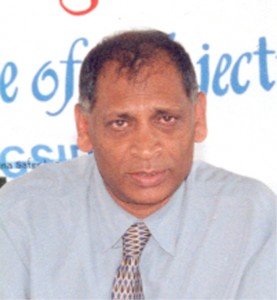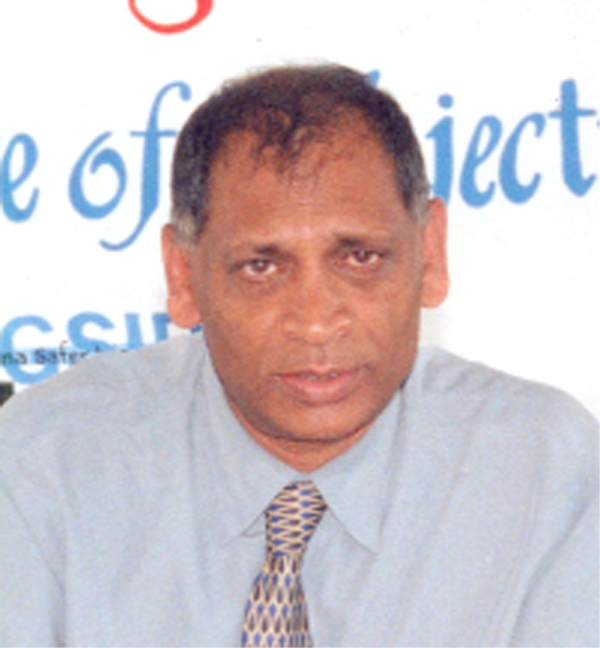– under new six-year grant
Guyana is expected to draw down some US$63 million ($12.6B) over the next six years from the Rolling Continuation Channel (RCC) of the Global Fund to fight AIDS, Tuberculosis and Malaria, an indication that it has performed well with previous grants.

The RCC was set up in November 2006 and proposals for its grants are by invitation only. The Global Fund’s secretariat only issues such invitations after it would have assessed a country’s performance with previous and existing grants.
Minister of Health Dr Leslie Ramsammy made the announcement about the new grant at his office yesterday, telling reporters that it had been approved mere hours before. According to the minister, the country will benefit from US$21million for the first three years and US$42 million for the following three after a performance review.
However, the minister explained that while the decision was taken yesterday it could take up to another 12 months to conclude negotiations and ink the contracts. But he estimates that Guyana would access the money by the end of the year.
The RCC is different from the grants accessed annually in November known as the ‘Rounds-Based Channel’. According to the Global Fund, while its board shall approve the rolling continuation of funding proposals for the entire term of the proposal there would only be a financial commitment for the initial three years. Funding for the second phase will be subject to the approval of the board based on a mid-point performance review.
Ramsammy told Stabroek News that the money will be used in the country’s HIV programme in areas such as treatment, voluntary counselling and testing (VCT) and Prevention of Mother to Child Transmission (PMTCT). He said out of the US$21 million earmarked for the first three years, US$2 million would be set aside for the non-governmental organisations (NGOs). He explained that the ministry would ask NGOs to participate in activities under the ministry’s programme and monies would be given to them to be utilised in specific areas.
According to the Global Fund’s website, the RCC was created in November “for well performing grants to apply for continuing funding for up to an additional six years beyond the original proposal term”. It stated that the RCC “is an invitation-only proposal process, for qualified applicants with strong performing, existing Global Fund grants”.
This is the first time Guyana will access funds under the RCC mechanism.
The grant under the RCC, according to the fund will allow for the scale-up and programme expansion under the overall goals of the original grant.
The RCC is also seen as a mechanism that creates a positive “incentive for strong performance by reason that continued funding under this channel is more streamlined and attractive (eg funding length and funding priority) than the Rounds-Based Channel.”
When the board made the decision to approve the RCC grant mechanism it saw it as one that would provide longer-term financing towards “national attempts to ensure sustainability of interventions that will have a long-term impact on the three diseases, as demonstrated by a grant contributing to broadly developed, inclusive, long-term national plans” to prevent and control AIDS, tuberculosis and malaria.
The Global Fund’s secretariat then established a standing cross-functional panel (the qualification panel) to conduct the determination of qualification of grants.
There must also be evidence of potential for impact by, for example, demonstration of the grant contributing to a national effort that has had, or has the potential to have in the near future, a measurable impact on the burden of the relevant disease. And in addition, in making a final determination, the qualification panel is expected to look at the sustainability, as determined by the extent to which the grant contributes to a national plan, which is inclusive of civil society and the private sector and transparently shows the financial contributions made to the plan by major funding sources. Last year, Guyana received a US$17.2 million grant under the Rounds-Based Channel, which the minister had said would have been used to combat HIV and tuberculosis.
Ramsammy had disclosed then that while Guyana’s proposal had requested US$34 million to fight all three diseases, it only received money for HIV and TB with no money being allotted to fight malaria in Guyana.
He had said that US$10.1 million of the grant would have been used for the health system strengthening programme in the area of HIV and the remaining sum to fight TB.
Last year was the fifth time Guyana received money from the fund’s Rounds-Based Channel, out of its eight funding rounds. Guyana received its largest grant in round three, when US$20.2 million was given to fight HIV. In three other rounds, Guyana received a total of US$6.9 million to fight malaria and TB. Dr Ramsammy said Guyana did not submit proposals in the other funding rounds.
Global Fund describes itself as a unique global public/private partnership dedicated to attracting and disbursing additional resources to prevent and treat HIV, tuberculosis and malaria.
To date, it has committed US$15.6 billion in 140 countries to support large-scale prevention, treatment and care programmes against the three diseases.

